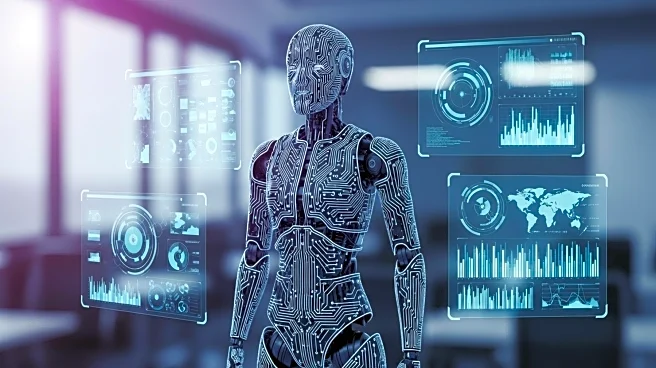What is the story about?
What's Happening?
A recent study by the Stanford Social Media Lab and BetterUp has highlighted the growing issue of 'workslop' in U.S. white-collar offices. This term refers to AI-generated content that appears polished but lacks substantive value, creating additional work for employees who must correct or complete these tasks. The study surveyed 1,150 U.S. desk workers, revealing that 40% have encountered such AI-generated work from colleagues. This phenomenon is causing a lack of trust and increased workload, as employees spend significant time rectifying these outputs. The study also notes that while AI tools are intended to enhance productivity, they often result in more work or a shift in how time is spent, rather than genuine efficiency gains.
Why It's Important?
The rise of AI-generated 'workslop' has significant implications for workplace dynamics and productivity. As AI tools become more prevalent, the expectation is that they will streamline tasks and reduce workloads. However, the reality is that these tools often require human oversight to ensure quality and accuracy, leading to increased demands on employees. This situation can strain workplace relationships and diminish trust among colleagues. Furthermore, the reliance on AI for tasks traditionally performed by humans could lead to job displacement, particularly in roles susceptible to automation. The need for human intervention in AI-generated tasks underscores the importance of maintaining a skilled workforce capable of managing and improving AI outputs.
What's Next?
As AI continues to integrate into workplace processes, companies may need to invest in training programs to enhance employees' ability to effectively use and manage AI tools. This could involve developing skills in AI oversight, quality control, and critical thinking to ensure that AI-generated content meets organizational standards. Additionally, businesses might need to reassess their reliance on AI for certain tasks and consider the potential impact on employee morale and productivity. The ongoing evolution of AI in the workplace will likely prompt further research and policy discussions on how to balance technological advancements with human labor needs.
Beyond the Headlines
The ethical implications of AI-generated 'workslop' are significant, as they raise questions about accountability and the value of human labor. The potential for AI to produce subpar work that requires human correction challenges the notion of AI as a purely beneficial tool. This development may also influence cultural perceptions of AI, as employees and employers navigate the complexities of integrating technology into traditional work environments. Long-term, the trend could lead to a reevaluation of job roles and responsibilities, as well as the development of new standards for AI-generated content in professional settings.















